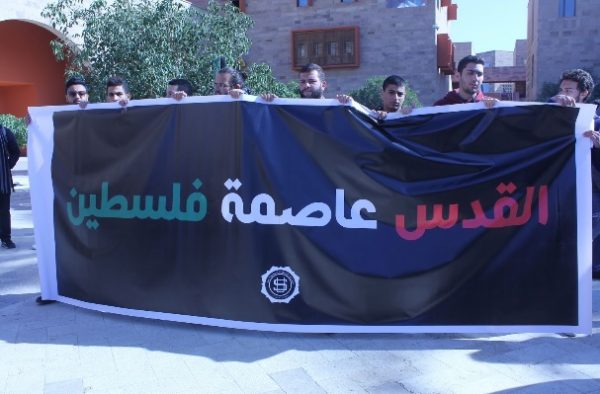By: Omar El Mor
A week after anger erupted at US President Donald Trump’s declaration that Jerusalem was the capital of Israel, the Organization of Islamic Cooperation meeting in Turkey fired back by recognizing Palestine as an independent state.
The 57-member OIC, lead by the chairmanship of Turkish President Recep Tayyep Erdogan, also declared East Jerusalem the capital of Palestine.
The OIC declaration may have stemmed the tide of popular anger in many Muslim countries, but outrage even a week after Trump’s decision was announced on December 6 is still palatable.
Fierce clashes broke out over the weekend in Jerusalem as Israeli forces killed at least four Palestinian protesters and wounded dozens more.
But Ashraf El-Sherif, a lecturer in political science at the American University in Cairo and expert on Middle East affairs, says that Trump’s decision was stating “what has been already established a long time ago”.
“In 1995, the [US] Congress approved moving the embassy to Jerusalem but gave the right to the president to postpone it for security reasons every six months. This has been the case under Clinton, George Bush and Obama,” El-Sherif told The Caravan.
Some feel that Trump now has the opportunity to move the embassy from Tel Aviv to Jerusalem because of the political situation in the Middle East and the increased polarization between the Iranian and the Saudi Arabian spheres of influence.
Israel and Saudi Arabia have increasingly seen common goals in deterring Iran’s nuclear ambitions and its influence in the Persian Gulf region.
Signing off on Jerusalem as the Israeli capital may be the bargaining chip the Saudis need to convince the Israelis to form a strategic alliance with some Sunni Arab countries against Shia Iran.
“Any kind of politics in the Middle East right now is practically moving towards the full liquidation of the Palestinian-Israeli conflict, under Israeli terms, because that was the requirement that Israel put in terms for the Saudi camp in order to stand with them against Iran,” El-Sherif said.
“And of course, America has sponsored this process.”
In the meantime, Muslim countries will focus on absorbing whatever anger spills out on the streets.
Accounting senior Aly Boghdady, who spearheaded the demonstration told The Caravan that Arab nations may find there is little they can do.
“The Arab position is clear, they won’t do anything that doesn’t end up in serving their interests,” he said.
But he said the AUC demonstration held last week was a positive move because it channeled the anger of the university community in a peaceful manner.
“What we did here was simply voicing our opinions. We can’t do anything but to demonstrate our opinion peacefully although we know that it will not change anything.”
The day after Trump’s Jerusalem announcement, the Student Union (SU) in collaboration with all student representatives of the community held a large demonstration on campus which ran for four hours.
Starting at the Four Palms in the Bartlett Plaza, the demonstration gradually increased in numbers right before settling in front of the Administration building at the School of Humanities and Social Sciences (HUSS) Plaza.
The demonstrators shouted condemnation of Trump’s move and chanted that the Israeli occupation of Palestine was illegal.
They also stomped on and burned the Israeli flag.
While there have been no demonstrations since then, some AUCians said that Trump’s declaration was a breaking point. Others said the possibility of a third world war was now more real.
Construction Engineering senior Youssef Marakby questioned whether the US had the economic, strategic, or national right to take such a decision on behalf of the Middle East.
He said the current crisis has been fermenting for 100 years and said it was a game of power between influential countries in the region.
Some have taken heart that Turkey may mobilize the rest of the Muslim world to take stern action.
But El-Sherif dismisses that.
“[Erdogan’s speeches] are rhetorical. I mean that’s more of propaganda. He wants to strengthen his position as the leader of Islamic causes in the region. It’s just a political propaganda campaign,” El-Sherif, who was also a nonresident associate in the Democracy and Rule of Law Program at the Carnegie Endowment for International Peace, said.
“Turkey is a close ally of Israel, economically and militarily. I don’t think that he’s going to suspend relations with Israel and so, this is kind of rhetorical propaganda that nationalists love to make and applaud for.
